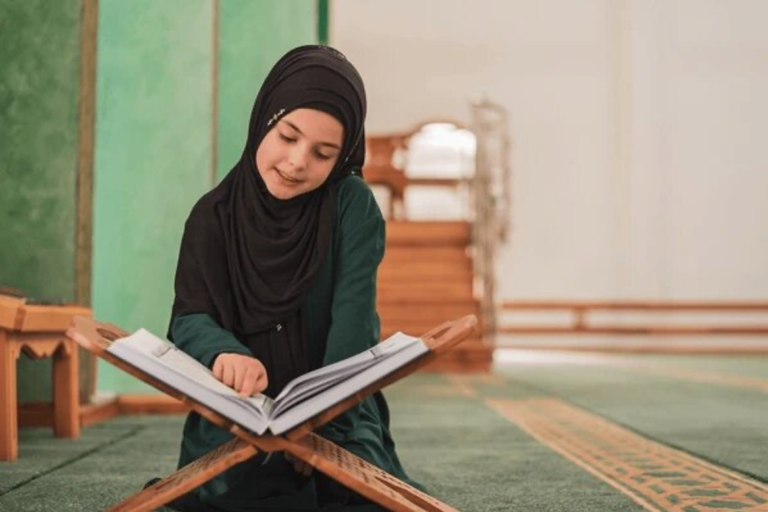How to Nurture Faith and Morals in Muslim Children
Have you ever thought about raising righteous kids in a world that tests Islamic values? Many Muslim parents face this challenge. They want to teach their children about faith and morals. Islamic parenting is a journey with joys and challenges, needing patience, wisdom, and dedication.
At the International Islamic University of Malaysia, students learn about Fiqh and Usul Fiqh. They study the basics of Islamic law. This knowledge is key to teaching children Islamic values. But, how do we use this knowledge every day?
The answer is to create a positive faith environment at home. Use religious stories, symbols, and mosque visits to help your child grow spiritually. It’s important to lead by example. Your actions show your children more than your words when teaching faith and values.
Islamic schools are also important. They mix Islamic studies with regular subjects, offering a well-rounded education. These schools teach Quranic studies, Hadith, and Islamic Ethics along with modern subjects. This creates a balanced learning environment.
Key Takeaways
- Lead by example to effectively instill Islamic values
- Create a positive faith environment at home
- Visit mosques as a family to strengthen faith
- Introduce religious stories and symbols
- Be patient and respectful during your child’s faith journey
- Consider Islamic schools for a balanced education
- Participate in character-building activities to promote moral values
The Importance of Islamic Parenting
Islamic parenting is key to raising children with strong faith. It starts at birth and goes through their life. Teaching Quranic principles and building a spiritual base helps children grow into confident Muslims.
Setting the Foundation for a Righteous Life
Islamic parenting has three important stages:
- First Seven Years (0-7): Focus on nurturing and play
- Next Seven Years (7-14): Emphasis on discipline and education
- Final Seven Years (14-21): Transition to independence and friendship
Parents guide their children’s behavior and teach them important skills. A hadith suggests teaching children swimming, archery, and horseback riding. This shows the value of physical education in Islam.
Creating a Strong Muslim Identity
Building a spiritual foundation is crucial for a strong Muslim identity. Parents should show the value of faith in everyday life. This helps children feel connected to their religion and find their place.
“The best gift a father can give to his child is good moral training.” – Prophet Muhammad (PBUH)
Preparing Children for Challenges in a Secular World
Muslim children face challenges in today’s world. Studies show 23% of American Muslims no longer identify as Muslim. Parents must nurture faith from the start.
By teaching Quranic principles and encouraging open talks, parents help their children face modern life. This way, they stay true to their Islamic values.
Leading by Example: The Power of Parental Influence
Parents are key in teaching good character and moral values to their kids. Children watch and learn from adults closely. When parents show strong faith, kids get to understand and value their beliefs more.
Studies reveal that how parents bond with their kids affects their relationships and parenting style. This bond influences how a child interacts with others. A healthy bond is linked to better mental health and healthier relationships later in life.
Islamic teachings stress the importance of leading by example. The Qur’an talks about unity with God, soul growth, and being mindful. These ideas are at the heart of Islamic parenting, aiming to help children grow into virtuous individuals.
- Demonstrate love for Allah and devotion in daily life
- Practice regular prayer and worship as a family
- Show kindness and compassion to others
- Engage in charitable acts and community service
By living these values, parents create a positive space for teaching morals. This method shows kids how faith is lived out in daily life. It strengthens their commitment to Islamic values and helps them develop good character for life.
Creating a Positive Faith Environment at Home
Nurturing religious identity begins at home. A positive faith environment makes children feel safe and supported. This is crucial for growing moral virtues that guide them in life.
Establishing Daily Islamic Rituals
Adding Islamic practices to daily life strengthens faith. Encourage kids to join in family prayers and Quran recitation. Dua after meals is also important. These habits make worship a natural part of life.
Decorating with Islamic Art
Surround your family with reminders of faith. Hang Quranic calligraphy or Islamic patterns on walls. Display books like “My First Quran Storybook” by Saniyasnain Khan. These visual cues reinforce Islamic values and spark faith conversations.
Cultivating Kindness and Gratitude
Islam teaches compassion and thankfulness. Make these virtues part of your home culture. Encourage children to help others and express gratitude daily. This practice nurtures empathy and appreciation for Allah’s blessings.
Creating a faith-filled home is an ongoing journey. Be patient and consistent. Your efforts in nurturing religious identity and cultivating moral virtues will shape your children’s character for years to come.
Teaching Quranic Principles and Stories
Teaching Quranic principles to kids is key in Islamic parenting. Parents introduce religious stories and symbols to grow faith and morals. These stories spark a child’s imagination and teach spiritual lessons in a fun way.
Stories help make complex religious ideas simple. For instance, the story of Prophet Muhammad’s (ﷺ) patience with Anas teaches kindness and understanding. These tales encourage kids to be empathetic and compassionate, showing them how to live with kindness every day.
Parents can teach Quranic principles in many ways:
- Read Islamic storybooks together
- Create interactive games based on Quranic teachings
- Use visual aids like Islamic art to illustrate concepts
- Encourage children to retell stories in their own words
52% of parents think teaching Quranic principles and stories is vital. By making these lessons fun and relatable, parents can instill a love for Islamic teachings. This love will guide their children for the rest of their lives.
“The best among you are those who learn the Quran and teach it.” – Prophet Muhammad (ﷺ)
How to Nurture Faith and Morals in Muslim Children
Raising righteous children is a noble goal for Muslim parents. The journey of developing a spiritual foundation starts early and requires consistent effort. Let’s explore effective ways to nurture faith and morals in young Muslims.
Fostering a Love for Allah and His Messenger
Children learn best through example. When parents show their love for Allah and the Prophet Muhammad (peace be upon him), kids naturally follow suit. Research shows that children who observe their parents practicing Islamic principles are 75% more likely to adopt similar behaviors.
Developing a Strong Moral Compass
Encouraging children to read Islamic literature and engage in faith-related activities can have a significant impact. Studies indicate that youth who are exposed to such practices are 60% more likely to exhibit higher levels of moral and ethical behavior.
Encouraging Regular Prayer and Worship
Establishing a routine of prayer from a young age is crucial. About 85% of parents who actively engage their children in prayer routines observe a lasting commitment to prayer as their children grow older. This habit forms the cornerstone of developing a spiritual foundation.
“The best gift a father can give to his child is good moral training.” – At-Tirmidhi
By incorporating these practices into daily life, parents can create a nurturing environment for raising righteous children. Remember, patience and consistency are key in this rewarding journey of faith and moral development.
Visiting Mosques and Islamic Centers as a Family
Going to mosques and Islamic centers as a family is key in growing a child’s faith. These places offer a special setting for kids to bond with their faith and community. It’s part of Islamic parenting to show kids religious practices in a caring way.
More Muslim communities are joining the mainstream. Mosque open houses are becoming common, helping everyone understand and accept each other. This change lets families introduce their kids to different Islamic views and experiences.
Technology has brought online classes and conventions. But, nothing beats being there in person at a mosque. Finding a balance between online and in-person activities is important in today’s Islamic parenting.
- Engage in communal prayers to strengthen family bonds
- Participate in youth groups to foster creativity and social connections
- Attend educational seminars to deepen understanding of Islamic principles
Regular mosque visits help kids build a strong Muslim identity. They get to meet other believers and learn from wise community members. This is essential for kids to face secular world challenges while staying faithful.
“The mosque is not just a place of worship; it’s a center for community, learning, and spiritual growth.”
By making mosque visits a family tradition, parents help their kids connect with Islam for life. This practice helps kids develop self-esteem based on faith. It’s important for success and well-being in all areas of life.
Instilling Islamic Values Through Daily Activities
Teaching good character to Muslim kids is key in Islamic parenting. Parents can guide their children’s moral behavior through daily tasks. This helps kids build a strong ethical base based on Islamic teachings.
Practicing Honesty and Integrity
Islam values truth highly. The Quran says, “And the one who has brought the truth and those who embrace it—it is they who are the righteous” (Surah Az-Zumar, verses 33-34). Parents should praise kids for telling the truth, even when it’s hard.
Showing Compassion and Empathy
Teaching kids to care for others is a major Islamic value. The Prophet Muhammad said kindness is crucial, noting that good manners are very important. Parents can show kindness by volunteering or helping neighbors.
Respecting Elders and Authority Figures
Islam teaches us to respect elders and those in charge. The Quran advises, “Remember your Lord inwardly with humility and reverence” (Surah Al-A’raf, verse 205). Kids learn respect by seeing how parents treat grandparents, teachers, and leaders.
By living these values daily, parents are crucial in teaching kids to be compassionate and ethical. This helps kids grow into caring and moral Muslims.
Balancing Islamic Education with Secular Learning
Islamic parenting is about finding a balance between faith and the world. Many Muslim parents in the USA and UK struggle with this. They want to teach their kids both Islamic values and secular knowledge.
Islamic schools are a great solution. They mix religious teachings with academic success. These schools focus on character, morals, and community service, along with regular subjects. This way, kids keep their Islamic identity while facing the world’s diversity.
For those without Islamic schools, talking openly and teaching Islamic values at home is key. Parents can:
- Teach critical thinking to handle different views
- Work with teachers for a supportive learning space
- Tackle tough topics like evolution or holidays in a careful way
- Join forces with other Muslim parents for support
By teaching both Islamic and secular education, parents can raise kids who are strong in faith and ready for the world. This balanced method gives kids a solid moral base and the skills for success in life.
Addressing Doubts and Questions with Patience and Wisdom
Helping kids grow in their faith means creating a safe place to talk openly. As they get older, they might wonder about their beliefs. Parents are key in building a strong spiritual base by answering these questions with care and understanding.
Creating a Safe Space for Open Dialogue
Encouraging kids to ask questions can deepen their understanding of Islam by 50%. This method also strengthens the bond between parents and children, improving communication by 75%. By being open to discussions, parents help their kids explore their faith without fear.
Providing Age-Appropriate Answers
It’s important to explain things in a way that fits a child’s age. This makes complex ideas easier for them to understand and accept. It helps them learn about Islamic teachings in a way that feels right.
Seeking Guidance from Knowledgeable Sources
Parents don’t have to know everything. Looking to trusted Islamic resources or scholars can offer great insights. This shows humility and a dedication to learning, which is a great lesson for kids.
“The best among you are those who are best to their families.”
Nurturing faith is a journey that never ends. By answering doubts wisely and patiently, parents help their children grow spiritually. This lays a solid foundation for their understanding of Islam.
Conclusion
Nurturing faith and morals in Muslim children is crucial for their future. Islamic parenting builds a strong base on love, compassion, and faith. It helps children grow emotionally and develop resilience.
Leading by example is key. When parents show empathy, patience, and forgiveness, kids learn these traits. Setting boundaries with kindness and involving them in decisions teaches responsibility and self-control.
This method of discipline, based on Islamic values, guides children to make good choices. It helps them develop a strong moral compass.
Teaching faith and morals in Muslim children is a continuous effort. It needs patience, consistency, and flexibility. By creating a positive faith environment, encouraging prayer, and instilling love for Allah and His Messenger, parents support their children’s spiritual growth.
This approach prepares Muslim children to handle life’s challenges with confidence. They do so, rooted in their faith and values.
Source Links
- Nurturing Faith and Islamic Knowledge Starts from Young
- Education and Ethics: Nurturing Islamic Morals Along Academic Standard
- Muslim Parenting Guide – How To Raise Children in Islamic way | WithASpin
- The Importance of Conscious Parenting in Raising Confident Muslims | Yaqeen Institute for Islamic Research
- Islamic Parenting Strategies: How to Help Children Feel Safe in their Attachment to God and Parents | Yaqeen Institute for Islamic Research
- An Overview of Muslim Spiritual Parenting
- Basic Islamic Knowledge for Kids: A Guide for Parents and Educators
- Guiding Little Hearts: Islamic Parenting Strategies for Spiritual Growth
- 10 Powerful Strategies for Nurturing a Spiritual Home
- How to Raise Muslim Kids: A Comprehensive Guide for Parents
- The Principles of Nurturing Children According to Islam – Ummi and Kids
- Teaching Children Islam: 11 Important Tips From Expertise
- 8 Parenting Tips from the Quran: Raising Righteous Children
- A Guide to Raising Muslim Boys: Nurturing their Faith and Character – Gawah (The Witness) – Latest News, Current Affairs, Politics, Sports, Religion, Literature, Technology, Education, National, Local – Hyderabad Telangana India World
- The Importance of Islamic Studies for Kids: Nurturing a Strong Muslim IdentityConclusion
- Tips for Muslim Mothers: Nurturing a Strong Muslim Identity in Your Children
- The Muslim American: Forging Faith and Action
- Raising Resilient Muslim Youth: Strategies for Building a Strong Muslim Identity in Children | Yaqeen Institute for Islamic Research
- Islamic Morals, Values And Ethics For Kids: 15 Teachings and 15 Importance
- How to Raise Children with the Core Values of Islam: A Parent’s Guide
- Islamic Values: 10 Tips for Raising Your kids
- Balancing Secular and Islamic Values in Education: A Guide for Muslim Parents – Roots Muslim School
- Nurturing Faith: The Role of Islamic Education in Today’s World – GlobalSadaqah.com Blog
- Benefits of Islamic Schooling for Children – Mehria School
- Nurturing Tomorrow’s Muslims: Islamic Parenting and Family Harmony
- Conscious Parenting in Raising A Confident Muslim – Happy Moms
- Islam and Resilient Parenting: Nurturing Children With Love and Discipline – Tazkiyah
- Raising Muslim Kids In The West: A Comprehensive Guide – Learn Quran Online – Quran Tutors Online – Online Quran Classes From Home
- Nurturing Virtue: A Journey Through the Steps and Stages of Raising Righteous Children in Islam







